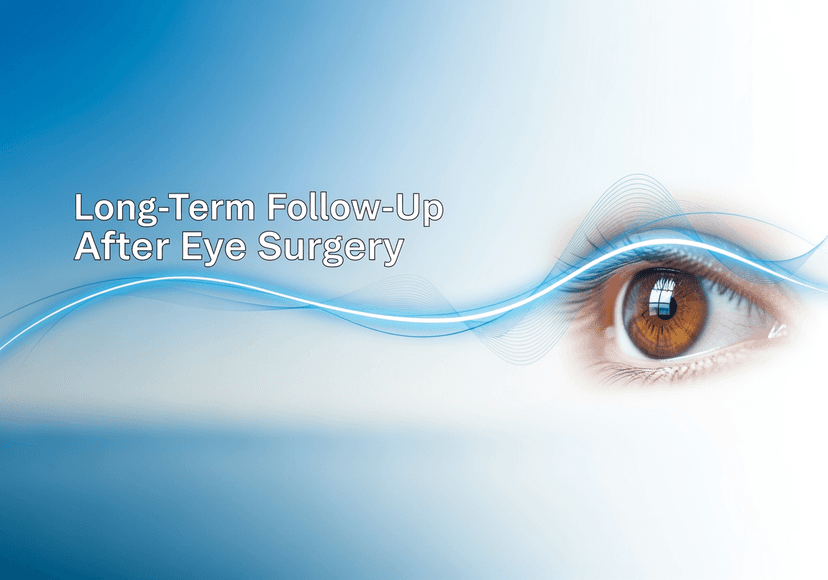
Healthtrip Experts Explain the Complete Eye Surgery Process
31 Oct, 2025
 Healthtrip
Healthtrip- < li>#who-needs-eye-surgeryWho Needs Eye Surgery? Identifying Common Conditions
- #types-eye-surgeryTypes of Eye Surgery: A Comprehensive Overview
- #where-eye-surgeryWhere to Get Eye Surgery: Top Hospitals and Clinics
- #Breyer Kaymak & Klabe AugenchirurgieBreyer, Kaymak & Klabe Augenchirurgie, Germany
- #Yanhee International HospitalYanhee International Hospital, Thailand
- #Vejthani HospitalVejthani Hospital, Thailand
- #Memorial Bahçelievler HospitalMemorial Bahçelievler Hospital, Turkey
- #Memorial Sisli HospitalMemorial Sisli Hospital, Turkey
- #how-prepare-eye-surgeryHow to Prepare for Eye Surgery: A Step-by-Step Guide
- #what-expect-surgeryWhat to Expect During and After Eye Surgery: A Detailed Look
- #benefits-risks-eye-surgeryBenefits and Risks of Eye Surgery: Weighing the Options
- #conclusionConclusion: Empowering Your Eye Health Journey
Understanding Your Options: Types of Eye Surgery
The world of eye surgery is vast and constantly evolving, offering a range of solutions for various vision problems. LASIK, perhaps the most well-known, reshapes the cornea to correct nearsightedness, farsightedness, and astigmatism. Imagine waking up every morning and seeing the world in sharp focus without reaching for your glasses – that's the promise of LASIK. Cataract surgery, on the other hand, involves replacing a cloudy lens with a clear artificial one, restoring vibrant colors and crisp details to your vision, a service offered by Memorial Sisli Hospital. Then there’s SMILE, a minimally invasive procedure also designed to correct refractive errors with a smaller incision. Each type of surgery boasts its own set of benefits and considerations, and the best option for you depends on your individual needs and eye health. Consulting with experienced ophthalmologists at hospitals like Yanhee International Hospital allows them to assess your specific condition and guide you toward the most suitable procedure, ensuring a personalized approach to achieving optimal vision correction. At Healthtrip, we connect you with leading specialists to help you explore these possibilities and make informed decisions.
Most popular procedures in India
The Initial Consultation: What to Expect
The initial consultation is a crucial first step on your eye surgery journey. Think of it as a fact-finding mission where you and your doctor get to know each other, and your eyes get a thorough examination. During this visit, your ophthalmologist, potentially at a facility like BNH Hospital, Bangkok, will review your medical history, discuss your vision goals, and perform a series of diagnostic tests to evaluate your eye health. These tests might include measuring your corneal thickness, assessing your pupil size, and checking for any underlying conditions that could affect the outcome of your surgery. Don’t be shy about asking questions! This is your opportunity to voice any concerns, clarify any doubts, and gain a clear understanding of the procedure, its risks, and its benefits. A good surgeon will take the time to listen to your needs, explain the process in detail, and help you determine whether you are a good candidate for eye surgery. Healthtrip can assist you in scheduling these consultations with trusted professionals, ensuring you start your journey with confidence and clarity.
Preparing for Surgery: A Step-by-Step Guide
Once you've decided to move forward with eye surgery, proper preparation is key to ensuring a smooth and successful experience. Your surgeon, perhaps from LIV Hospital, Istanbul, will provide you with specific instructions tailored to your chosen procedure and your individual needs. These instructions typically include avoiding certain medications, such as blood thinners, in the days leading up to the surgery. You'll also likely be advised to discontinue wearing contact lenses for a period of time, as they can alter the shape of your cornea. On the day of the surgery, it's important to arrive on time, avoid wearing makeup or jewelry, and have a responsible adult accompany you home. It's also a good idea to prepare your home environment to be comfortable and conducive to recovery, stocking up on any necessary supplies and arranging for assistance with daily tasks. By following your surgeon's instructions carefully and taking the necessary precautions, you can optimize your chances of a positive outcome and a speedy recovery. Healthtrip ensures you receive detailed pre-operative guidance and support, so you feel fully prepared and confident as you approach your surgery date.
Wellness Treatments
Give yourself the time to relax
Lowest Prices Guaranteed!

Lowest Prices Guaranteed!
The Surgery Day: What Happens During the Procedure
The day of your eye surgery might feel a bit nerve-wracking, but knowing what to expect can help ease your anxiety. When you arrive at the surgical center, perhaps at Mount Elizabeth Hospital in Singapore, you'll be greeted by a team of caring professionals who will guide you through the final preparations. You'll likely receive eye drops to numb your eyes and possibly a mild sedative to help you relax. During the procedure, which typically takes only a few minutes per eye, your surgeon will use sophisticated technology to reshape your cornea or replace your lens, depending on the type of surgery you're undergoing. You might feel some pressure or a slight sensation, but the procedure is generally painless. Rest assured that your surgeon and the surgical team will be closely monitoring you throughout the entire process, ensuring your comfort and safety. Healthtrip partners with hospitals that use state-of-the-art equipment and adhere to the highest standards of care, providing you with a safe and comfortable surgical experience. We help you navigate the process, ensuring transparency and support throughout every stage.
Post-Operative Care: Recovery and Aftercare
The journey doesn’t end when the surgery is complete; in fact, the post-operative period is just as crucial for achieving optimal results. Following your surgeon’s instructions diligently is vital for a smooth recovery, potentially after a procedure at Fortis Memorial Research Institute, Gurgaon. You'll likely be prescribed eye drops to prevent infection and reduce inflammation, and you'll need to attend follow-up appointments to monitor your progress and address any concerns. During the initial recovery period, it's important to protect your eyes from bright light and avoid activities that could strain them, such as reading or using electronic devices for extended periods. You may also need to wear a protective shield at night to prevent accidental rubbing or bumping of your eyes. While some patients experience immediate improvement in their vision, others may notice gradual changes over several weeks or months. Be patient with the process and communicate any discomfort or concerns to your surgeon. Healthtrip continues to support you after your surgery, providing access to aftercare resources and connecting you with medical professionals who can address any questions or issues that may arise, ensuring a seamless and worry-free recovery.
Potential Risks and Complications
Like any surgical procedure, eye surgery carries some potential risks and complications, although they are relatively rare. It’s crucial to be aware of these possibilities before making a decision. Potential risks can include dry eyes, glare, halos, infection, and, in very rare cases, loss of vision. Your surgeon, potentially at Breyer, Kaymak & Klabe Augenchirurgie, will discuss these risks with you in detail during your consultation and take steps to minimize them. Choosing an experienced and qualified surgeon, like those facilitated by Healthtrip, and following their pre- and post-operative instructions carefully can significantly reduce your risk of complications. Remember, open communication with your surgical team is key. Don’t hesitate to ask questions or express any concerns you may have. Healthtrip is committed to transparency and provides you with the information you need to make informed decisions about your health, ensuring that you are well-prepared for every aspect of your eye surgery journey, including understanding the potential risks and how they are managed.
Who Needs Eye Surgery? Identifying Common Conditions
Vision, that precious window to the world, can sometimes become clouded or distorted, impacting our daily lives in profound ways. From reading a book to driving a car, clear eyesight is essential for navigating the world safely and enjoying it fully. When corrective lenses like glasses or contacts no longer suffice, eye surgery emerges as a beacon of hope, offering the potential to restore or significantly improve vision. But how do you know if eye surgery is the right choice for you? The decision isn't always straightforward, and it depends on various factors, including the specific eye condition, its severity, and your overall health. It's essential to consult with an experienced ophthalmologist who can thoroughly evaluate your eyes and discuss your individual needs and expectations. They'll consider your lifestyle, your current vision correction, and any underlying medical conditions to determine if you're a suitable candidate for surgery. Remember, eye surgery isn't a one-size-fits-all solution, and a comprehensive assessment is crucial to ensure the best possible outcome. Healthtrip can connect you with qualified ophthalmologists at leading hospitals like Breyer, Kaymak & Klabe Augenchirurgie, Germany, and Yanhee International Hospital, Thailand, to help you explore your options.
Several common eye conditions can be effectively treated with surgery, offering a renewed sense of clarity and freedom. Cataracts, those cloudy formations that develop on the lens of the eye, are a leading cause of vision loss worldwide. As cataracts progress, they can blur vision, making it difficult to see clearly. Fortunately, cataract surgery is a highly successful procedure that involves removing the clouded lens and replacing it with a clear artificial lens. Refractive errors, such as nearsightedness (myopia), farsightedness (hyperopia), and astigmatism, occur when the eye's shape prevents light from focusing correctly on the retina. LASIK, PRK, and SMILE are popular refractive surgeries that reshape the cornea, allowing light to focus properly and reducing the need for glasses or contacts. Glaucoma, a condition that damages the optic nerve, can lead to irreversible vision loss if left untreated. While there's no cure for glaucoma, various surgical procedures can help lower eye pressure and slow the progression of the disease. Other conditions like diabetic retinopathy, macular degeneration, and strabismus (crossed eyes) may also benefit from surgical intervention. Recognizing these conditions and understanding the potential benefits of surgery are the first steps towards reclaiming your visual independence. Consider exploring options at hospitals like Vejthani Hospital, Thailand, or Memorial Bahçelievler Hospital, Turkey, known for their expertise in eye care.
The impact of impaired vision extends far beyond simply seeing clearly. It can affect your ability to work, participate in hobbies, and even perform everyday tasks like cooking or driving. Imagine struggling to read street signs, recognize faces, or enjoy the vibrant colors of a sunset. These challenges can lead to frustration, isolation, and a diminished quality of life. For many, eye surgery isn't just about improving vision; it's about regaining independence, confidence, and the ability to fully engage with the world around them. It's about being able to play with your grandchildren, pursue your passions, and live life to the fullest. The decision to undergo eye surgery is a personal one, and it should be made in consultation with your doctor after carefully considering the potential benefits and risks. But for those who are good candidates, eye surgery can be a life-changing experience, opening up a world of new possibilities and restoring a sense of joy and wonder. Healthtrip is committed to providing you with the information and resources you need to make informed decisions about your eye health. Connect with leading medical facilities like Memorial Sisli Hospital in Turkey through Healthtrip, and take the first step towards a brighter, clearer future.
Types of Eye Surgery: A Comprehensive Overview
The world of eye surgery has undergone a remarkable transformation in recent years, with advancements in technology and techniques offering a wide range of options to address various vision problems. From laser-assisted procedures to intricate microsurgery, the choices can seem overwhelming. Understanding the different types of eye surgery available is crucial for making informed decisions about your eye health. Each procedure has its own unique approach, benefits, and potential risks. Knowing the nuances of each option allows you to have a more productive conversation with your ophthalmologist and develop a personalized treatment plan that best suits your individual needs. It's like choosing the right tool for a specific task – the more you know about the tools available, the better equipped you are to achieve the desired outcome. Healthtrip simplifies this process by providing comprehensive information and connecting you with experts at leading hospitals.
Cataract surgery, a marvel of modern medicine, remains one of the most frequently performed and highly successful eye surgeries. The procedure involves removing the clouded natural lens of the eye and replacing it with an artificial lens, known as an intraocular lens (IOL). There are different types of IOLs available, each offering various benefits. Monofocal IOLs provide clear vision at a single distance, typically for far vision, while multifocal IOLs can correct both near and distance vision, reducing the need for glasses. Toric IOLs are designed to correct astigmatism, a common refractive error that causes blurred vision at all distances. The choice of IOL depends on your individual vision needs and lifestyle. Refractive surgeries, such as LASIK (Laser-Assisted In Situ Keratomileusis), PRK (Photorefractive Keratectomy), and SMILE (Small Incision Lenticule Extraction), aim to correct refractive errors by reshaping the cornea, the clear front part of the eye. LASIK involves creating a thin flap on the cornea, reshaping the underlying tissue with a laser, and then repositioning the flap. PRK removes the outer layer of the cornea, which then heals naturally. SMILE is a minimally invasive procedure that involves removing a small lenticule of tissue from within the cornea. Each of these procedures has its own advantages and disadvantages, and the best option for you will depend on your individual eye characteristics and preferences. Explore these options with professionals at Yanhee International Hospital, Thailand, or Memorial Sisli Hospital, Turkey, facilitated through Healthtrip.
Beyond cataract and refractive surgeries, there are other specialized procedures that address specific eye conditions. Glaucoma surgery aims to lower the pressure inside the eye, preventing further damage to the optic nerve. Trabeculectomy is a common glaucoma surgery that creates a new drainage pathway for fluid to exit the eye. Minimally invasive glaucoma surgery (MIGS) techniques offer less invasive alternatives with faster recovery times. Corneal transplants are performed to replace a damaged or diseased cornea with a healthy cornea from a donor. This procedure can restore vision in individuals with corneal conditions such as keratoconus or corneal scarring. Vitrectomy is a surgery that involves removing the vitreous gel, the clear jelly-like substance that fills the eye. This procedure is often used to treat conditions such as diabetic retinopathy, macular degeneration, and retinal detachment. Strabismus surgery corrects misaligned eyes by adjusting the muscles that control eye movement. This surgery can improve eye alignment, reduce double vision, and improve depth perception. With such a diverse range of surgical options available, it's essential to consult with a qualified ophthalmologist who can assess your individual needs and recommend the most appropriate treatment plan. Healthtrip can assist you in finding the right specialist and accessing the best possible care, potentially at facilities like Breyer, Kaymak & Klabe Augenchirurgie, Germany.
Where to Get Eye Surgery: Top Hospitals and Clinics
Choosing the right place for eye surgery is a decision that shouldn't be taken lightly. It's not just about the physical location; it's about entrusting your vision to a team of skilled professionals who have the expertise, experience, and technology to deliver the best possible outcome. The hospital or clinic you select can significantly impact your overall experience, from the initial consultation to the post-operative care. Factors such as the surgeons' qualifications, the availability of advanced technology, the quality of patient care, and the overall reputation of the facility should all be carefully considered. Think of it as choosing a pilot for a long flight – you want someone with a proven track record, a well-maintained aircraft, and a commitment to safety. Healthtrip understands the importance of this decision and provides access to a network of leading hospitals and clinics around the world, each with its own unique strengths and specializations.
When evaluating hospitals and clinics for eye surgery, it's essential to look beyond the glossy brochures and marketing materials. Research the credentials and experience of the surgeons who will be performing your procedure. Are they board-certified? Have they completed fellowships in their area of specialization? How many procedures have they performed? Also, inquire about the technology and equipment available at the facility. Does it have state-of-the-art diagnostic tools and surgical equipment? Is the facility accredited by recognized organizations? Equally important is the quality of patient care. Do the staff members treat patients with compassion and respect? Are they responsive to questions and concerns? Does the facility have a good reputation for patient satisfaction? Online reviews and testimonials can provide valuable insights into the experiences of other patients. It's also a good idea to speak with your primary care physician or other healthcare professionals for recommendations. Healthtrip can help you gather this information and connect you with highly regarded facilities known for their excellence in eye care.
The following are just a few examples of top hospitals and clinics that offer exceptional eye surgery services, all of which you can explore further through Healthtrip: Breyer, Kaymak & Klabe Augenchirurgie in Germany is renowned for its advanced refractive surgery options and experienced surgeons. Yanhee International Hospital and Vejthani Hospital in Thailand are popular choices for medical tourists seeking high-quality eye care at affordable prices. Memorial Bahçelievler Hospital and Memorial Sisli Hospital in Turkey offer a comprehensive range of eye surgery services, including cataract surgery, glaucoma surgery, and corneal transplants. Consider Saudi German Hospital Alexandria, Egypt, for comprehensive eye care services in the Middle East. Remember, this list is not exhaustive, and there are many other excellent facilities around the world that specialize in eye surgery. The key is to do your research, ask questions, and choose a facility that meets your individual needs and preferences. Healthtrip is here to guide you every step of the way, providing you with the information, resources, and support you need to make informed decisions about your eye health.
Breyer, Kaymak & Klabe Augenchirurgie, Germany
Breyer, Kaymak & Klabe Augenchirurgie, located in Düsseldorf, Germany, stands out as a leading center for refractive surgery and comprehensive eye care. This clinic is known for its commitment to utilizing the latest advancements in technology and techniques to provide patients with exceptional outcomes. The surgeons at Breyer, Kaymak & Klabe are highly experienced and internationally recognized experts in their field, specializing in procedures such as LASIK, PRK, SMILE, and cataract surgery. The clinic's focus on personalized care ensures that each patient receives a customized treatment plan tailored to their specific needs and vision goals. From the initial consultation to the post-operative follow-up, the team at Breyer, Kaymak & Klabe is dedicated to providing a comfortable and supportive experience for every patient. The clinic's state-of-the-art facilities and commitment to innovation make it a top choice for individuals seeking advanced eye surgery in Germany. Healthtrip can help you connect with this esteemed clinic and explore your options for achieving clearer vision.
Yanhee International Hospital, Thailand
Yanhee International Hospital, situated in Bangkok, Thailand, has earned a global reputation as a premier destination for medical tourism, particularly for eye surgery. This hospital attracts patients from all over the world who are seeking high-quality care at affordable prices. Yanhee International Hospital boasts a dedicated team of ophthalmologists who are skilled in performing a wide range of eye surgeries, including cataract surgery, LASIK, PRK, and glaucoma surgery. The hospital's modern facilities are equipped with advanced technology, ensuring accurate diagnoses and effective treatments. In addition to its medical expertise, Yanhee International Hospital is known for its excellent patient service and comfortable accommodations. The hospital's multilingual staff is committed to providing a seamless and stress-free experience for international patients. Healthtrip can facilitate your journey to Yanhee International Hospital, assisting with travel arrangements, accommodation, and communication with the medical team.
Vejthani Hospital, Thailand
Vejthani Hospital, also located in Bangkok, Thailand, is another leading medical facility that offers comprehensive eye care services. With a strong focus on patient safety and quality, Vejthani Hospital has established itself as a trusted provider of eye surgery for both local and international patients. The hospital's ophthalmology department is staffed by experienced surgeons who are proficient in performing a variety of procedures, including cataract surgery, refractive surgery, and retinal surgery. Vejthani Hospital is committed to using the latest technology and techniques to achieve optimal outcomes for its patients. The hospital's patient-centered approach ensures that each individual receives personalized care and attention throughout their treatment journey. Vejthani Hospital's commitment to excellence and its convenient location make it an attractive option for those seeking eye surgery in Thailand. Healthtrip can provide you with detailed information about Vejthani Hospital and help you plan your medical trip.
Memorial Bahçelievler Hospital, Turkey
Memorial Bahçelievler Hospital, located in Istanbul, Turkey, is part of the renowned Memorial Healthcare Group, known for its commitment to providing world-class medical services. The hospital's ophthalmology department offers a comprehensive range of eye surgery options, from routine procedures to complex interventions. The surgeons at Memorial Bahçelievler Hospital are highly skilled and experienced in performing cataract surgery, glaucoma surgery, corneal transplants, and other specialized procedures. The hospital's state-of-the-art facilities are equipped with advanced technology, allowing for precise diagnoses and effective treatments. Memorial Bahçelievler Hospital is dedicated to providing a comfortable and supportive environment for its patients, with a focus on personalized care and attention. The hospital's commitment to excellence and its convenient location in Istanbul make it a popular choice for medical tourists seeking eye surgery in Turkey. Healthtrip can assist you in connecting with Memorial Bahçelievler Hospital and exploring your treatment options.
Memorial Sisli Hospital, Turkey
Memorial Sisli Hospital, also located in Istanbul, Turkey, is another flagship hospital within the Memorial Healthcare Group. This hospital is recognized for its multidisciplinary approach to patient care and its commitment to using cutting-edge technology. The ophthalmology department at Memorial Sisli Hospital offers a full spectrum of eye surgery services, including cataract surgery, refractive surgery, glaucoma surgery, and retinal surgery. The hospital's team of highly qualified ophthalmologists are dedicated to providing personalized care and achieving the best possible outcomes for their patients. Memorial Sisli Hospital's modern facilities, combined with its commitment to patient satisfaction, make it a leading destination for eye surgery in Turkey. The hospital's convenient location in the heart of Istanbul makes it easily accessible for international patients. Healthtrip can facilitate your journey to Memorial Sisli Hospital, providing support with travel arrangements, accommodation, and communication with the medical team. With Healthtrip, finding the right hospital for your eye surgery becomes a seamless and stress-free experience.
Also Read:
How to Prepare for Eye Surgery: A Step-by-Step Guide
Preparing for eye surgery can feel a bit like getting ready for a big trip – you want to make sure you've packed everything you need, know the route, and have a solid itinerary. The key difference here is that your "trip" involves your precious eyesight! To start, you'll have a thorough consultation with your surgeon. This isn't just a formality; it's your chance to ask all those burning questions, discuss your concerns, and understand the procedure inside and out. Think of it as a detailed briefing before the main event. Don't hesitate to bring a list of questions – no question is too silly when it comes to your vision. Your surgeon will evaluate your overall eye health, measure your vision, and assess any potential risks. They'll also discuss the type of anesthesia used and any specific instructions you need to follow.
Next up, you'll need to arrange for transportation to and from the surgery center. Since your vision might be temporarily blurry or impaired after the procedure, you definitely won't be able to drive yourself. Enlist a friend, family member, or even a rideshare service to ensure you get home safely. It's also a good idea to prepare your home environment to make your recovery as smooth as possible. Stock up on any necessary medications, eye drops, or pain relievers. Make sure you have plenty of comfortable pillows, blankets, and entertainment options to keep you occupied while you rest. Consider prepping some easy-to-eat meals or snacks, so you don't have to worry about cooking when you're feeling less than your best. Think of it as creating a cozy recovery nest where you can relax and focus on healing.
In the days leading up to your surgery, your doctor will likely advise you to avoid certain medications, such as blood thinners, which can increase the risk of bleeding. They might also recommend that you stop wearing contact lenses for a specific period leading up to the procedure, as contacts can alter the shape of your cornea and affect the accuracy of the surgery. On the day of your surgery, wear comfortable, loose-fitting clothing and avoid wearing any makeup, lotions, or perfumes around your eyes. These products can increase the risk of infection or interfere with the procedure. Follow your surgeon's instructions regarding food and drink – you might need to fast for a certain number of hours before the surgery. And most importantly, try to relax! Taking deep breaths, listening to calming music, or practicing meditation can help ease any pre-surgery jitters. Remember, you're in good hands, and this procedure is designed to improve your vision and enhance your quality of life.
What to Expect During and After Eye Surgery: A Detailed Look
Okay, let's talk about what actually happens on surgery day. Walking into the surgery center, you might feel a mix of excitement and nerves. That's completely normal! The first thing you'll do is check in and go through some pre-operative procedures. The friendly staff will verify your information, answer any last-minute questions, and get you prepped for the procedure. You'll likely change into a comfortable gown and have your vital signs monitored. The anesthesia team will also chat with you about the type of anesthesia you'll be receiving, whether it's local anesthesia with sedation or general anesthesia. During the procedure itself, you might feel some pressure or mild discomfort, but you shouldn't experience any significant pain. The surgery usually takes anywhere from a few minutes to an hour, depending on the type of procedure. Your surgeon will use advanced techniques and technology to correct your vision or address any underlying eye conditions. Throughout the surgery, the staff will be there to monitor your comfort and ensure everything goes smoothly.
Now, let's fast forward to the recovery period. After the surgery, you'll be taken to a recovery area where you can rest and recuperate. Your vision might be blurry or hazy at first, but this is usually temporary. You'll receive detailed instructions on how to care for your eyes, including how to administer eye drops, clean the area around your eyes, and protect your eyes from bright light and dust. It's crucial to follow these instructions carefully to minimize the risk of infection and promote proper healing. For the first few days after surgery, you'll need to take it easy and avoid strenuous activities, heavy lifting, and anything that could put pressure on your eyes. You'll also need to wear protective eyewear, such as sunglasses or a shield, to protect your eyes from the sun, wind, and other environmental irritants. Avoid rubbing your eyes, as this can disrupt the healing process and potentially cause complications. You need to be patient with your eyes.
Follow-up appointments are a crucial part of the recovery process. Your surgeon will schedule regular check-ups to monitor your progress, assess your vision, and make any necessary adjustments to your treatment plan. These appointments are your chance to ask any questions you have and address any concerns. Be open and honest with your doctor about how you're feeling and what you're experiencing. In terms of results, most people experience a significant improvement in their vision after eye surgery. However, it's important to have realistic expectations. Your vision might not be perfect right away, and it can take several weeks or even months for your vision to fully stabilize. Be patient and trust the process. With proper care and attention, you'll be well on your way to enjoying clearer, sharper vision and a better quality of life. Healthtrip can assist you in finding the best surgeons and hospitals like Memorial Bahçelievler Hospital and Memorial Sisli Hospital for your eye surgery needs.
Also Read:
Benefits and Risks of Eye Surgery: Weighing the Options
Deciding whether or not to undergo eye surgery is a big decision, and it's important to carefully weigh the potential benefits against the possible risks. On the bright side, the benefits of eye surgery can be life-changing. For many people, it can mean freedom from glasses or contact lenses, improved vision, and a greater sense of independence. Imagine waking up in the morning and being able to see clearly without reaching for your glasses! Eye surgery can also improve your quality of life, allowing you to participate in activities you might have previously avoided due to poor vision. Whether it's playing sports, driving at night, or simply enjoying the scenery, clear vision can make a world of difference. Certain types of eye surgery can also address underlying eye conditions, such as cataracts or glaucoma, which can significantly improve your overall eye health. For example, Healthtrip can help connect you with top hospitals like Breyer, Kaymak & Klabe Augenchirurgie and Yanhee International Hospital to explore options for vision correction.
Of course, like any medical procedure, eye surgery does come with potential risks and complications. These can include infection, dry eyes, blurry vision, glare, halos, and in rare cases, vision loss. However, it's important to remember that these risks are generally low, and most complications can be effectively managed with proper treatment and care. Your surgeon will discuss these risks with you in detail during your consultation and take steps to minimize them. One of the best ways to reduce your risk is to choose an experienced and qualified surgeon who uses advanced techniques and technology. Thoroughly research your options, read reviews, and ask for recommendations. Don't be afraid to ask your surgeon about their experience, success rates, and the steps they take to ensure patient safety. A skilled and reputable surgeon will prioritize your well-being and take the necessary precautions to minimize any potential risks. Healthtrip can help you find certified and experienced surgeons, ensuring you receive the best possible care.
It's also important to have realistic expectations about the outcome of your surgery. While most people experience a significant improvement in their vision, it's not always possible to achieve perfect 20/20 vision. Your vision might fluctuate in the weeks or months following surgery, and you might still need to wear glasses or contacts for certain activities. Be patient with the healing process and follow your surgeon's instructions carefully. If you experience any unusual symptoms or have any concerns, contact your doctor right away. Open communication with your healthcare team is key to ensuring a successful outcome. Ultimately, the decision to undergo eye surgery is a personal one. Consider all the factors involved, weigh the potential benefits and risks, and talk to your doctor to determine if it's the right choice for you. By making an informed decision, you can empower yourself to take control of your eye health and enjoy a brighter, clearer future.
Also Read:
Conclusion: Empowering Your Eye Health Journey
Embarking on the journey to improve your eye health through surgery is a significant step, and it's one that deserves careful consideration and informed decision-making. We've explored various aspects of eye surgery, from preparing for the procedure to understanding the potential benefits and risks. Armed with this knowledge, you're now better equipped to navigate the world of vision correction and make choices that are right for you. Remember, your eyesight is precious, and it's worth investing in its well-being. Regular eye exams, a healthy lifestyle, and appropriate medical interventions can all play a role in maintaining optimal vision throughout your life. Whether you're considering LASIK, cataract surgery, or another type of eye procedure, take the time to research your options, consult with qualified professionals, and develop a personalized treatment plan that meets your unique needs. Healthtrip is here to support you in finding the best healthcare providers like Vejthani Hospital and Saudi German Hospital Cairo, Egypt, offering a seamless experience from consultation to recovery.
Ultimately, the goal is to empower you to take control of your eye health and enjoy a brighter, clearer future. Don't let fear or misinformation hold you back from exploring the possibilities that eye surgery can offer. Talk to your doctor, ask questions, and gather all the information you need to make an informed decision. With the right care and attention, you can achieve significant improvements in your vision and enhance your overall quality of life. Embrace the opportunity to see the world with greater clarity and confidence. Your eyes are your windows to the world, and by taking care of them, you're investing in a lifetime of visual experiences. So, go forth with knowledge, courage, and a positive attitude, and embark on your eye health journey with confidence. Healthtrip is committed to guiding you every step of the way, ensuring you have access to the best resources and support to achieve your vision goals.
Remember to prioritize your eye health and make it an ongoing commitment. Schedule regular eye exams, even if you think your vision is fine. Many eye conditions can develop gradually without noticeable symptoms, and early detection is key to preventing vision loss. Eat a healthy diet rich in fruits, vegetables, and omega-3 fatty acids, which are essential for maintaining healthy eyes. Protect your eyes from the sun by wearing sunglasses with UV protection. And don't hesitate to seek professional help if you experience any changes in your vision or have any concerns about your eye health. With proactive care and informed decision-making, you can enjoy a lifetime of clear, comfortable vision and a brighter, more fulfilling life. Let Healthtrip be your trusted partner in this journey, providing you with the tools and resources you need to achieve your vision goals and live life to the fullest.
Most popular wellness packages
Related Blogs

Long-Term Follow-Up After Eye Surgery
Detailed insights into eye surgery – doctors, hospitals, technology, recovery,

Healthtrip’s Transparency in Eye Surgery Pricing and Packages
Detailed insights into eye surgery – doctors, hospitals, technology, recovery,

Frequently Asked Questions About Eye Surgery
Detailed insights into eye surgery – doctors, hospitals, technology, recovery,

Advanced Robotic Technology Used in Eye Surgery
Detailed insights into eye surgery – doctors, hospitals, technology, recovery,

How Healthtrip Supports Foreign Patients for Eye Surgery in India
Detailed insights into eye surgery – doctors, hospitals, technology, recovery,

Top Medical Packages for Eye Surgery Offered by Healthtrip
Detailed insights into eye surgery – doctors, hospitals, technology, recovery,










